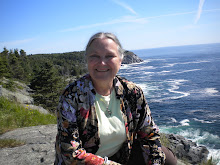I just came from a memorial service for an old friend of my family's, a Unitarian Universalist service at the congregation where I grew up. The family, the congregation she had been part of from its very beginning, and people from our old neighborhood sat with one another, the art she had made, and the photographic record of the long love she had shared with her beloved husband. We shared stories of the ways we had known her. For me, from the old neighborhood, she was part of the fabric of my early life, so much that while I remember mostly the sparkle of her eyes and the attentiveness of her face, no special stories come to mind. It has been a long time.
I wrote a poem about oak trees when her husband died, and the story of her passing is for me very similar. We grew under oak trees in that old neighborhood, oaks that now fall, one by one, both real oaks and metaphorical ones. As one of them passes, it leaves an opening in the canopy of the forest, a space of light, and the realization that we of the next generation are spreading our branches into being parts of that canopy ourselves. It is an awesome process. And it's worthwhile for us mature ones of the next generation to gather and notice it happening, to honor our being oaks ourselves. We return each time from wherever we have gone. Jane is, I think, the very last one of those old pioneers. I will hear of and return for memorial services for others -- but for me, the generation of parents from the neighborhood has passed.
So at this last service for that generation of parents, a bunch of really old kids gathered. We're in our early sixties now, with graying hair and expanded waistlines, scattered beyond the forested canopy of that old neighborhood, some of us now retired from long-term jobs, and all of us kids again in our gathering to remember our network of parents. Over punch and cookies after the memorial service, I search the faces of people who look vaguely familiar to recognize the children I knew. (Searching this way, I fail to recognize someone I only know as a grownup.)
Stories arise about the way things were in those days when the network of parents called us to supper, offered us games to play and art projects to enjoy, shared grownup wisdom with us as they hung out the laundry. It had taken them some trouble to form themselves into that network. They had been strangers at first. But as they maintained a community association, held monthly covered-dish suppers, organized a community water system, and the rest, they had gotten to know each other and each other's children really well. We kids never found out until much later what a rare thing this was.
Now they are gone, and we really old kids have lived our adult lives mostly in places where that gift of community is not present. We have built or not built networks of parents for our children in other ways. Church is one way to do that. My own mother never approved of church. She said it cut you off from the diversity of beliefs and ways of getting through life that are out there in the world. But for me, stuck out here in the "real" world, church has been a way to do it without giving up the richness of diversity entirely. As good as that old neighborhood was, diversity of class, race, and age were not a strong feature of it then. Still, the children in my church community mostly can't run over to someone's house to play or to visit over a cookie and a glass of milk, something that building community in a neighborhood allows.
The really old kids got together again, and remembered being kids with a network of parents, running freely through the unfenced yards to play wherever and with whomever. Maybe there is some strength for the future in our remembering.
Subscribe to:
Post Comments (Atom)

No comments:
Post a Comment